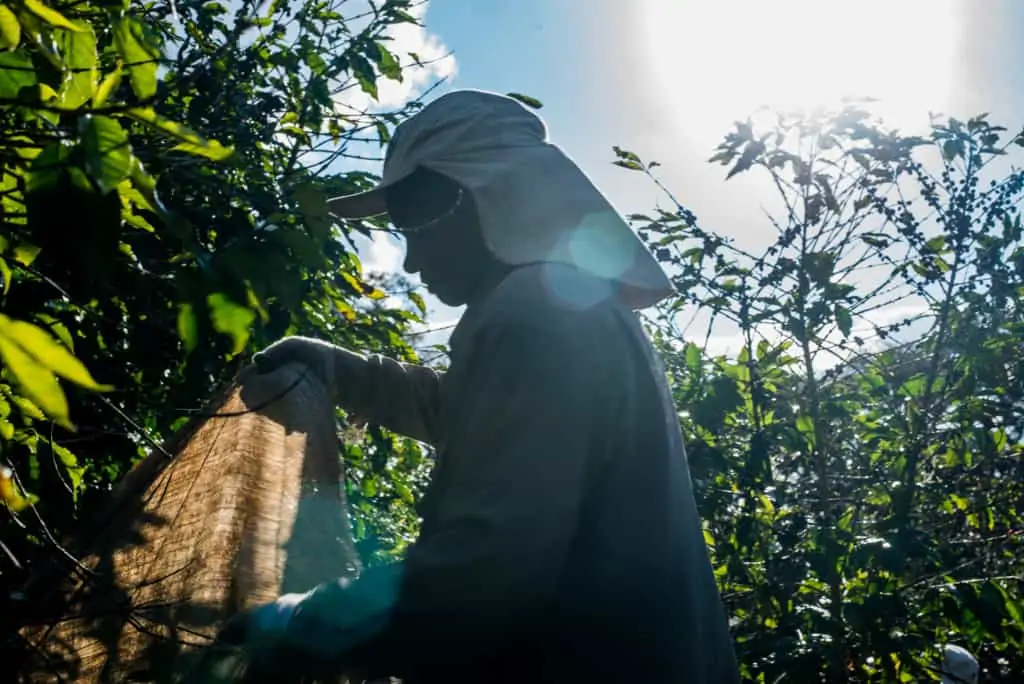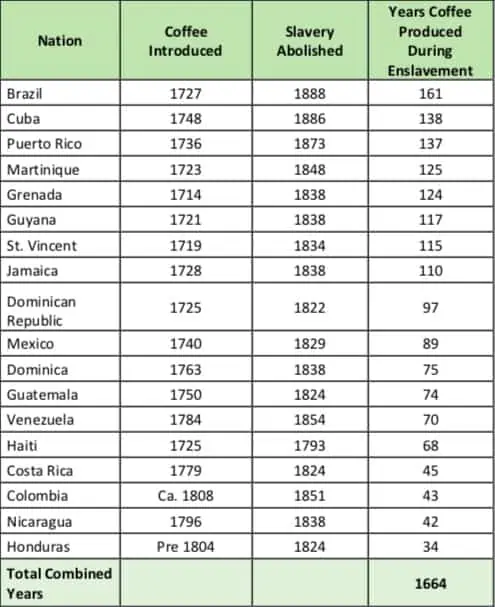
Woman working on farm in Minas Gerais, Brazil. Photo by Danielle Seréjo.
Introduction by Kenneth Davids, Editor in Chief
Phyllis Johnson, longtime president of green coffee importer BD Imports, has emerged as an eloquent spokesperson for acknowledgement and change at a time when specialty coffee is searching for an effective response to systemic racism in the U.S. Her writing and speeches have rallied the specialty coffee community and she has created an outlet and focus for action by founding the new Coffee Coalition for Racial Equity.
When we decided to focus this month’s issue of Coffee Review on Black-owned American coffee roasters (see August 2020 Tasting Report: Recognizing Coffees from Black-owned Coffee Companies), we asked for Phyllis’s help in organizing our report. She recommended this month’s impressive co-cupper Alicia Adams, for example. We also invited Phyllis to write a piece on any subject she chose to appear with our report and reviews.
Phyllis’s contribution appears here, a piece that combines a look at the crucial importance of Black slavery in the establishment of coffee as America’s stimulant of choice, before moving to the possibilities for a new inclusivity in the coffee industry and the importance of recognizing and supporting a continuity of Black involvement in the new world of specialty coffee.
Although the call to action at the end of this/Phyllis’ piece is aimed more at the coffee industry than at consumers, certainly coffee lovers can contribute, both by supporting the many organizations aimed at asserting racial equity in the U.S., as well as buying specialty coffees from Black-owned roasters like those reviewed in this month’s issue. And, as Phyllis points out, by finding ways to be part of change generally, in all aspects of our lives. We can only make a better future by understanding and fully acknowledging the past.
*
Phyllis Johnson writes:
For 21 years, I’ve worked as a green coffee importer in the U.S. and considered the absence of my fellow Black Americans in the industry. In 2018, I wrote an article for Roast Magazine titled “Strong Black Coffee, Why Aren’t African Americans More Prominent in the Coffee Industry?” The greatest reward has been the countless individuals who’ve reached out saying the article inspired their journey. When Coffee Review contacted me concerning its desire to share stories, feature coffees, and showcase the expertise of Black coffee professionals, I was excited to get involved. We often think of Africa when considering the contributions of Blacks in coffee. However, the contributions to coffee made by Blacks in the Americas are crucially significant.
The Past
Close to 2,000 years of combined labor by the enslaved in the Americas built the foundation to the 225-billion-dollar coffee industry we enjoy today. Coffee production and enslavement co-existed in the West Indies and Central and South America for more than 160 consecutive years in nearly 30 countries. The first suppliers of coffee to the U.S. colonies were the West Indies. Production volumes by the enslaved, with human sacrifice at its fullest, equaled those achieved now using modern mechanization.
The chart below (Figure 1) was constructed through my research, but the idea came from a reviewer of one of my previous articles who pushed back on my claim that the U.S. had longstanding relationships that relied on coffee produced by enslaved labor. The reviewer went on to say that the U.S. colonies initially relied on Haiti for coffee imports and that Haiti’s revolution ended its production a few years after coffee became important in the colonies, around 1773. The suggestion was that our history of importing coffee produced by enslaved labor lasted “only decades.” (I assume he meant the two decades between the Boston Tea Party in 1773 and the Haitian Revolution in 1793.) However, while Haiti was the U.S. colony’s primary supplier of raw coffee prior to its revolt in 1793, the U.S. continued to rely heavily on production in the West Indies for years to come. The enslaved in the West Indies generated a vast amount of wealth in coffee for the world and met the demand for growing U.S. consumption habits. Coffee’s increased demand in the Americas and the world coincided with enslavement of Black and indigenous individuals in production, in some cases lasting for many decades. Some countries later moved away from coffee and focused more on sugar production, but slavery remained key in all cases.
Figure 1: The Coexistence of Coffee Production and Enslavement in Latin America

The importance of Blacks in coffee began when coffee began, at the very start of production in the Americas. When coffee became popular in the U.S. colonies after the Boston Tea party in 1773, the colonized West Indies was the principle source of supply, even though that region is no longer considered a major supplier today. When the U.S. colonies became the United States of America in 1776, we continued to rely on coffee production in the West Indies.
The West Indies shipped almost 600 million pounds of green coffee to the United States between 1789 and 1806. (See Figure 2.)
Legacies of the Past
Two legacies of this history remain:
- Blacks in the U.S. continue to be disempowered and underrepresented in coffee. We are far too comfortable with Black faces on our marketing materials instead of on our marketing teams, physically in our work environments, and in decision-making roles.
- Many of the countries that colonized the West Indies and beyond still hold claim to the largest assets in coffee today through trading companies, land ownership and production capabilities the world over. Ironically, the West Indies region is no longer a major supplier to the U.S., and we now look more to Central and South America.
Figure 2: United States of America Coffee Imports in Pounds by Caribbean Region 1789-1806

From McDonald, M. (2005). The Chance of the Moment: Coffee and the New West Indies Commodities Trade. The William and Mary Quarterly, 62(3), third series, 441-472. doi:10.2307/3491531
The contributions in production by enslaved Blacks in the West Indies and Central and South American coffee fields didn’t stop in the producing countries. As we follow the raw coffee beans across the ocean, research shows us that 13 U.S. states were the primary ports of entry for coffees arriving from the West Indies, with Philadelphia, Pennsylvania by far the most active in receiving coffee imports during the late 1700s and early 1800s.
Research conducted by Gary Nash, author of Slaves and Slaveowners in Colonial Philadelphia, showed that, although wealthy home and land-owners were most likely to enslave others, 10% of those holding slaves were ship captains who did not own a home or land. These ship captains’ assets were strictly tied to ownership of human life, the enslaved. Michelle Craig McDonald’s paper “The Chance of the Moment: Coffee and the New West Indies Commodities Trade,” reveals that during the late 1700s and early 1800s, 88% of vessels bringing coffee into the United States from the West Indies were American-owned, with captains directly or indirectly invested in the enslavement of Blacks to ensure deliveries and build their fortunes. Basically, enslaved Blacks were not only key to producing coffee, but were also loading and unloading ships filled with coffee imported into the U.S.
Figure 3: The Overlap of Coffee Production and Enslavement in the Southern U.S.

We must understand the contributions of the past to help build the way forward. I look ahead to the day when we are not only looking back at the contributions of Blacks in coffee but seeing current icons among us who have made great strides. Historians seem to place greater value in remembering the kings, missionaries, explorers and brutal colonists who carried the bean from country to country and enforced labor, yet they sum up the production and labor force as simply a dark and tragic history. How important was coffee trade in early American history? McDonald’s study of the post-revolutionary coffee trade illustrates the importance of the West Indies to early American economic development. As demand grew rapidly after 1783 for home consumption, coffee also became one of the U.S.’s profitable re-export commodities.
The Present
Black entrepreneurs like myself and others I’ve included in this article are motivated by coffee’s history — we envision a place of leadership for Blacks in coffee. The industry can learn a lot from professionals who possess the passion and ancestral connections to coffee.

David and Gaïna Dávila, of Dávila Kafe.
No one appreciates the contributions and potential that exists in the West Indies more than coffee entrepreneurs David and Gaïna Dávila, of Dávila Kafe. David and Gaïna describe themselves as a couple with roots in two of the least represented countries in the western hemisphere — Gaïna is Haitian-born, and David has roots in Nicaragua and Puerto Rico. Their inspiration to build a successful coffee business is deeply rooted in their understanding and appreciation of Haiti’s history.
“Today,” they point out, “Haiti continues to grow the Typica variety of Arabica, one of the oldest coffee varieties in production, mostly unchanged since it was brought to the western hemisphere. Even during a global pandemic, Haitian farmers continue to work tirelessly to improve the quality of their coffee production and their earnest efforts must not go unnoticed. Coffee, as we know it today, would not exist without the stony road trod by Haiti.”
It takes someone, like a strong leader with the calming voice of Launtia Taylor, to speak about her own childhood growing up in Trelawney Jamaica on her family coffee estate. She remembers deciding which tree she would climb to choose the fruit of her liking for her lunch. Launtia explains that coffee, cocoa and rum were life saviors for her family. “When I started working in coffee in the U.S., I was attending coffee training classes and I began to notice that I already knew so much of what was being taught especially when it came to the growing, reaping and processing of coffee prior to market. I was not familiar with the technical terms, but I certainly had firsthand knowledge of the journey of the bean. When I was young, my dad would start the day by roasting coffee in the kitchen for breakfast. I started drinking coffee around age seven. To me, there is nothing better than freshly roasted coffee with coconut milk in the morning. I didn’t realize that I already knew so much about coffee, except for the fact that it was my favorite drink at breakfast. To us, growing up with coffee was simply a part of everyday life; we had no idea it was such a precious commodity representing such a vital part of the world’s economy, not to mention the added health benefits.”
History provides fuel to continue to push forward in an industry where there’s little recognition of the greatness and contributions of Blacks in coffee. Our coffee heroes are typically the founders of famous and well-known successful brands. We offer respect to the inventors of novel brewing and roasting equipment, and researchers who are responsible for developing coffee varieties gain our respect. More recently, we’ve turned our favor to those who can prepare the beverage in the most dynamic and profound way. Basically, we are comfortable celebrating those who’ve done well in coffee and ignoring the contributions of others.
If we are to embrace the foundation laid for today’s vibrant U.S. coffee industry, then we, as Black coffee professionals, must lead the way. Although this history belongs to everyone, it is these stories and research that fuel us.
Recent tragedies, especially in the U.S., have caused us to examine the treatment of Black citizens, as we are quarantined in our homes and considering how we might be complicit in our lives and work. Let me say, we are complicit. Every conference, meeting, stage, café, work environment, board room, trip to origin roster, cupping table, international development program, etc., with zero-to-little racial diversity shows complicity, and we must work together to change this reality.
The Road Forward
We have a unique moment in time to be engaged in understanding our history and creating actions to yield better outcomes in the future. In early June, I penned a call to action in the form of an open letter to the U.S. coffee industry on racism. The response has been overwhelmingly positive. The action behind this letter is taking flight. We are working towards establishing The Coffee Coalition for Racial Equity (CCRE), a 501(c)(3) organization whose mission is to build a racially diverse and equitable industry where everyone’s talents can be recognized, developed to their fullest potential and rewarded. We also believe it is important to understand the role that race has played in coffee’s history.
Join us on this journey to serve as a volunteer or offer support to help build a better coffee industry for the future. This article is the start to what I hope will be future highlights and stories of Black contributors to coffee all around the world, both past and present. As Coffee Review brings various coffee entrepreneurs and stories from a more diverse group, I hope that you enjoy the stories and coffees (see August 2020 Tasting Report: Recognizing Coffees from Black-owned Coffee Companies). We are all part of the solution. Continue to enjoy beautiful coffees and keep in mind we have so much to uncover in this beautiful and vibrant industry.











